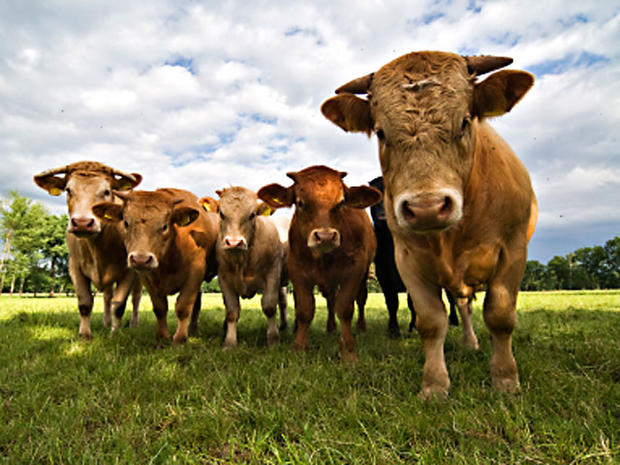FDA restricts certain antibiotics in livestock
(CBS/AP) Are antibiotics overused? In animals, maybe. The Food and Drug Administration on Wednesday ordered farmers to limit the use of a certain type of antibiotics, called cephalosporins, they give livestock. The agency said the antibiotics may make people more resistant to antibiotics they may need to save their lives.
PICTURES: 7 Dangerous Myths about Antibiotics
FDA officials have long believed antibiotics given to animals before slaughter are linked to growing antibiotic resistance in humans. But they have previously struggled with the issue because the powerful livestock industry says the drugs are needed to keep animals healthy. Now, consumers are more aware of the issue and are also clamoring for antibiotic-free meat.
The agency's order will limit cephalosporins, which are given to some cattle, swine, chickens and turkeys before slaughter. The drugs are used to treat pneumonia, skin infections and meningitis, among other diseases, in humans.
Cephalosporins, which are injected directly into eggs or animals, are not as widely used as many other antibiotics that are mixed with animal feed in massive quantities. But they are significant because they are used in life-threatening situations for humans - and lives could be lost if resistance is built up over time.
"This is an incredibly critical class of antibiotics for humans," said David Wallinga, a physician at the Institute for Agriculture and Trade Policy in Minnesota and a member of the Keep Antibiotics Working coalition. "In the medical world you'd call it a `big gun' or a `drug of last resort.' It's effective against a pretty broad spectrum of bacteria."
The drugs can be particularly critical for treating salmonella poisoning, the FDA said. Exposure to food containing antibiotic-resistant bacteria like certain forms of salmonella is "the most significant risk to the public health associated with antimicrobial resistance," said the agency. In recent years, the number of foodborne outbreaks associated with antibiotic-resistant pathogens has been increasing, a trend the agency associates with animal antibiotic use.
Why do farmers use antibiotics in even healthy animals? Reasons include to spur growth or to keep them well in unsanitary feedlot conditions.
The FDA's order to limit cephalosporins is not a total ban, and the agency would still allow some uses of the drug in agriculture. Advocates praised the move but said it didn't go far enough.
Industry groups said after the announcement that they opposed the limits and argued there isn't enough evidence that their antibiotic use is unsafe. Kristina Butts of the National Cattlemen's Beef Association said antibiotic resistance is a complex issue and "the top priority for cattle producers is to raise healthy cattle because healthy cattle are the foundation of a safe, wholesome food supply."
"While this announcement today is a great first step," said Laura Rogers of the Pew Campaign on Human Health and Industrial Farming. "More work needs to be done."
The issue is "often more emotional than intellectual," Rogers said, and the need for change will be even greater as the market responds to consumer demand - as grocery stores and restaurants now tout antibiotic-free meats.

